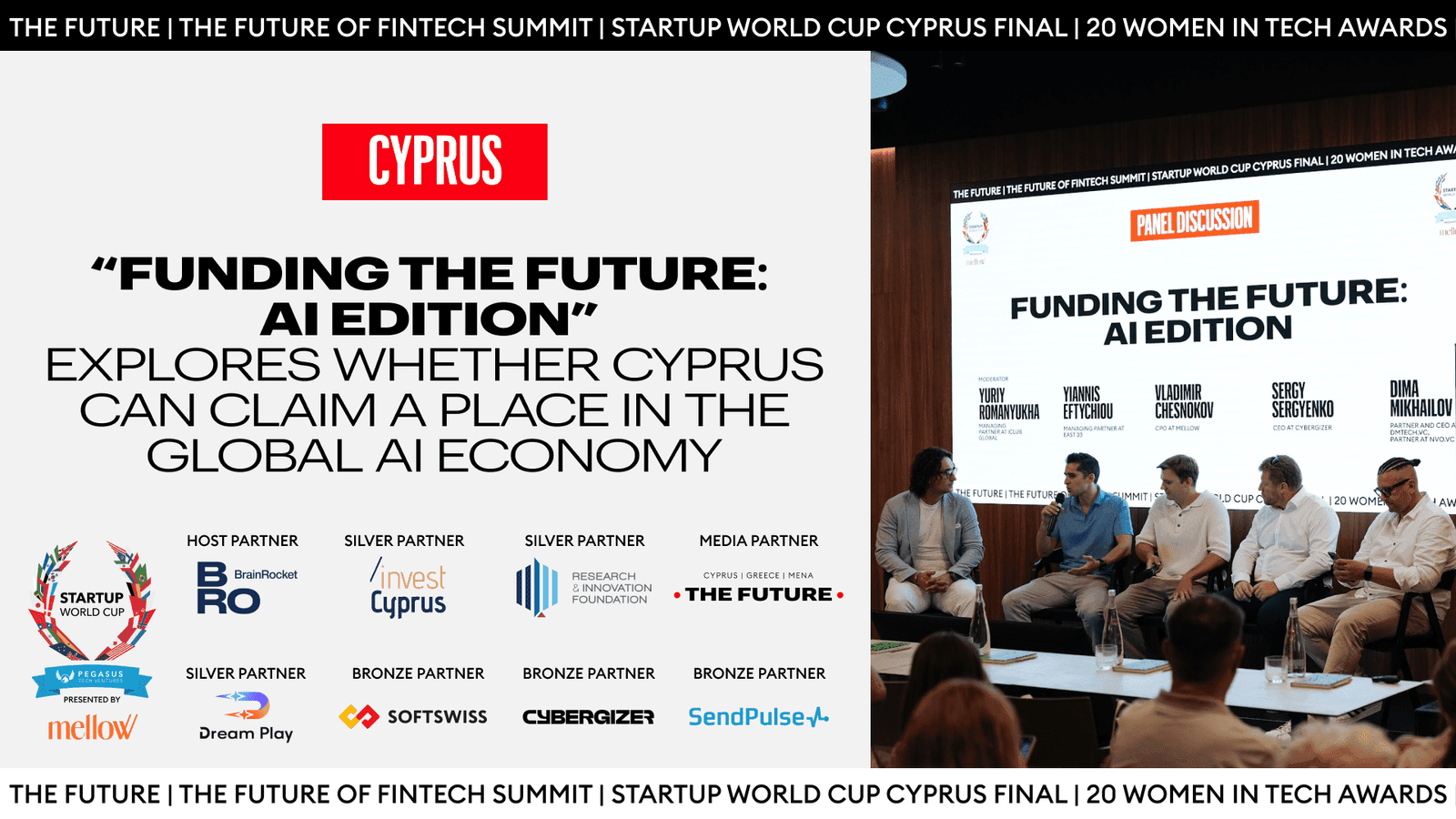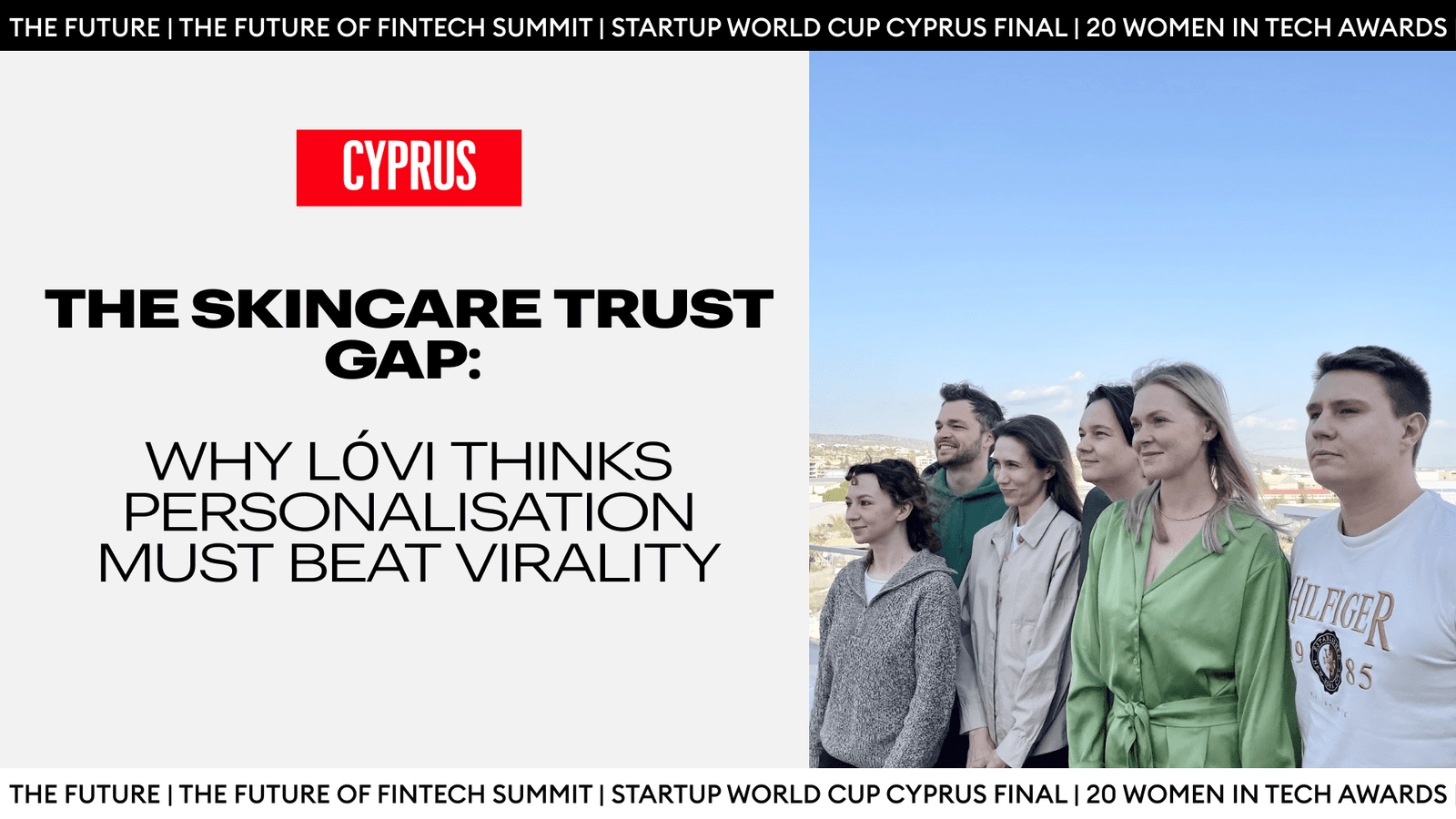“The best way to predict the future is to create it,” said Dima Mikhailov, a fitting tone-setter for the second panel discussion at the 2025 Startup World Cup Cyprus Regional Final. Titled “Funding the Future: AI Edition,” the session examined how Cyprus is positioning itself in the competitive and fast-moving AI global economy. Moderated by Yura Romanyukha (ICLUB Global / TA Ventures), the panel featured:
- Yiannis Eftychiou, from 33East VC
- Dima Mikhailov, from Data Mining Technologies
- Vladimir Chesnokov, from Mellow
- Sergey Sergyenko, from Cybergizer
Talent: The Currency in the AI Race
Romanyukha opened the discussion with a look at the current global battle for AI talent, citing examples such as Meta reportedly offering signing bonuses of up to $100 million. The panelists unanimously agreed: AI talent is now a key competitive edge, a limited and highly valued resource. Its scarcity is influencing how venture firms structure deals, and how startups attract funding, secure top-tier engineers, and accelerate development timelines to remain viable amid intense market pressure.
Follow THE FUTURE on LinkedIn, Facebook, Instagram, X and Telegram
Eftychiou made clear that in the venture capital world, team quality remains paramount, especially in AI, where business models continue to evolve. “Nobody knows exactly what the business model is going to look like,” he explained. What matters most is backing the right people. He pointed to OpenAI and DeepMind as talent incubators whose alumni now command high premiums in the marketplace.
Mikhailov, who has been investing in AI since before it became a buzzword, reinforced the importance of mission-motivated innovation. “The best way to predict the future is to create it,” he said. In his view, AI has already transformed the world; companies must now adapt or risk obsolescence.
Chesnokov emphasized team alignment and purpose as key differentiators in attracting top talent. High salaries may bring people through the door, but long-term success depends on values, autonomy, and a culture that supports innovation.
Sergyenko offered a different perspective, arguing that the current concentration of AI talent in big tech is unsustainable. He predicted a cultural change toward decentralization, where smaller startups using open-source tools and localized AI infrastructure will gain a leg-up in the economy.
Time-to-Market: Compressing the Startup Lifecycle
One of the strongest messages from the panel was the dramatic acceleration of product development. Chesnokov illustrated how Mellow’s internal venture teams were able to develop and launch three AI products in under three months. With today’s tools, he said, founders can go from concept to market in weeks.
“Two to three months max to launch a product and go to market,”
Chesnokov advised.
However, Chesnokov warned against placing too much emphasis on technology alone. AI may improve speed, but without a clear product-market fit, curated distribution, and strong execution, even the most sophisticated tools can fall short.
Compliance and the Promise of Local AI
The discussion then turned to one of AI’s more complex challenges: regulation. Sergyenko pointed to the growing importance of building secure, compliant, and locally managed AI solutions. In regulated sectors such as healthcare, law, and finance, he argued, startups must invest in controlling their own infrastructure and models.
He introduced the concept of “local AI,” which he explained to be a self-contained technology stack that includes proprietary data, on-premise inference hardware, and domain-specific models. This approach, while currently resource-heavy, allows companies to meet strict compliance standards and maintain data sovereignty.
Romanyukha supported this view, pointing to the European automation firm Depo as a strong example. Their approach to promoting privacy first, aligned with EU regulations, demonstrates how compliance can be used as a strategic advantage.
The Acquisition Surge: Opportunity or Overheating?
Romanyukha cited recent data indicating over 200 AI acquisitions in the past two quarters alone. Mikhailov described this as a reflection of traditional firms realizing they need AI to remain competitive. “If they don’t have AI as a vertical, they will die,” he stated, predicting that the acquisition spree would continue for another 12 to 18 months before leveling off.
He shared a recent win from his portfolio: a company acquired by a major player at a valuation. “It wasn’t just an acquisition,” he said. “It was unbelievable.”
Eftychiou offered a more tempered view. While half of 33East’s current pipeline involves companies with a core AI component, he cautioned that hype can cloud judgment. “AI is a secular trend with real utility,” he said, “but you still have to back the team first.”
Is Cyprus Ready to Lead?
The panel concluded with the question: Can Cyprus become a regional AI hub?
Eftychiou pointed to encouraging data: with approximately 30,000 ICT professionals, Cyprus has a strong tech density relative to its population. In comparison, Athens hosts an estimated 10,000 to 15,000 developers. He stressed the growing investor interest and momentum within the ecosystem.
Mikhailov expressed even more enthusiasm:
“A huge job is already done. Limassol is the next Palo Alto or maybe Delhi.”
He cited the island’s talent concentration and investor presence as signs of its potential.
Sergyenko urged the ecosystem to take the next step: rather than just building with AI, Cyprus should aim to build AI technologies itself. Sergyenko argued that Cyprus’s future in AI hinges on moving beyond adoption and into development, that is, building proprietary models, technical infrastructure, and local expertise that reflect the country’s capabilities and regulatory context.
The final message was clear. Cyprus has the talent, ambition, and early wins. To solidify its position, it must double down on strategic investment, regulatory frameworks, and homegrown talent.














